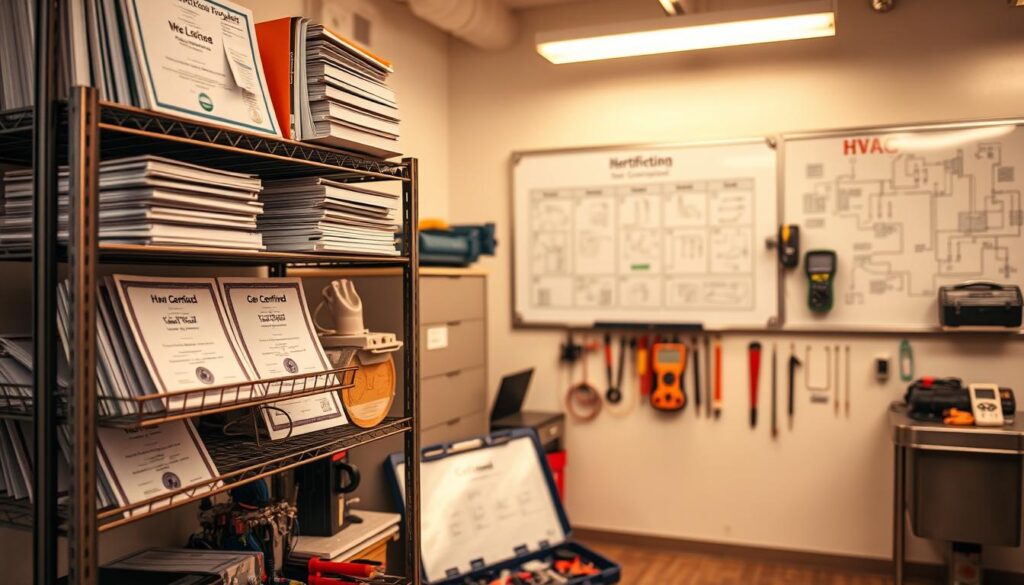Affiliate Disclosure
HVAC Guide Guys is a participant in the Amazon Services LLC Associates Program, an affiliate advertising program designed to provide a means for sites to earn advertising fees by advertising and linking to Amazon.
How Good Does HVAC Pay? Are you thinking about an HVAC career for financial stability? With 441,200 technician jobs in 2023 and a 9% job growth forecast, HVAC is more than just a job. It’s a promising career path.

HVAC salaries are getting better, with workers earning $40,000 to $70,000 a year. The average salary is $57,300. This makes HVAC a great choice for those wanting a steady income without a lot of student debt.
So, how much does HVAC pay? It’s more than you might think. HVAC technicians can earn even more with specializations, certifications, and promotions. Your skills can lead to big financial rewards, from home repairs to complex commercial systems.
Key Takeaways
- HVAC offers stable career opportunities with strong job growth
- Median annual salary reaches $57,300 in 2023
- Potential to earn between $40,000 and $70,000 annually
- Low training costs compared to traditional four-year degrees
- Multiple paths for career advancement and income growth
Table of Contents
Understanding the HVAC Industry and Career Prospects
The HVAC industry is key in today’s world, with lots of job chances for skilled workers. As buildings get more complex and focus on saving energy, HVAC techs are vital. They keep places comfy and green.
HVAC jobs are on the rise. Stats show a 5% growth from 2022 to 2032, meaning about 24,000 new jobs in the U.S. This growth opens up great chances for those looking to make a good living in HVAC.
What HVAC Technicians Do
HVAC techs install, fix, and keep heating, cooling, and air systems running. They do many things:
- Find and fix system problems
- Put in new equipment
- Do regular upkeep
- Make sure systems use less energy
- Fix tricky mechanical issues
The Growing Demand for HVAC Professionals
Several things are making HVAC jobs more in demand:
- More focus on saving energy
- New tech in climate control
- More homes and buildings being built
- People caring more about the environment
Industry Overview and Market Trends
Right now, HVAC jobs are booming. Over 650,000 people work in HVAC, with good pay and many career paths. HVAC techs make about $50,590 a year, with some making over $100,000.
“The HVAC industry is not just about fixing machines—it’s about creating comfortable, sustainable environments for people.” – Industry Expert
There’s also a chance to work in green energy and solar. This makes HVAC a career with lots of room to grow and earn well.
Explore Our HVAC Shop
Looking for top-rated HVAC tools, parts, and accessories? Visit our shop and find the perfect solution for your needs.
Visit the ShopHow Good Does HVAC Pay: Comprehensive Salary Analysis
Exploring HVAC job pay reveals a promising career with good earnings. HVAC technicians see varying salaries based on experience, specialization, and location.
Now, let’s look at HVAC salaries:
- Entry-level HVAC technicians make $40,000 – $50,000 a year.
- Mid-career pros earn $50,000 – $80,000 yearly.
- Senior HVAC experts can make over $80,000.
Your experience greatly affects your HVAC pay. Specialized roles can lead to higher earnings:
| Specialization | Average Annual Salary |
|---|---|
| Commercial HVAC Technicians | $63,000 |
| HVAC Project Engineers | $74,000 |
| Aviation HVAC Technicians | Up to $79,000 |
Pro tip: Invest in continuous learning and certifications to maximize your earning in the HVAC industry.
“The HVAC industry offers stable and competitive compensation for skilled professionals who are willing to develop their expertise.” – Industry Expert
Top-paying industries for HVAC technicians include natural gas distribution, aerospace manufacturing, and electric power generation. Median hourly rates range from $32 to $41.
Entry-Level HVAC Technician Salaries and Growth Potentials
Starting a career in HVAC can be very rewarding financially. It’s a field that offers good pay for those who work hard and learn a lot. The starting salaries for entry-level technicians are quite attractive.
When you start in HVAC, knowing what you can earn is key. This knowledge helps you make smart choices about your career. Let’s look at the promising opportunities and growth paths for beginners.
Starting Wages for New Technicians
New HVAC technicians can look forward to good starting wages. These wages are a solid base for future earnings. On average, they earn between $22.47 to $26.52 an hour. This means their yearly salary can range from $45,760 to $55,000.
| Experience Level | Hourly Wage | Annual Salary |
|---|---|---|
| Entry-Level (0-1 year) | $22.47 | $45,760 |
| Mid-Level (1-5 years) | $26.52 | $55,000 |
Career Advancement Opportunities
Your earnings in HVAC can increase with more experience and certifications. There are different career levels you can move through:
- Entry-level technician
- Specialized service technician
- Senior technician
- HVAC supervisor or manager
“Invest in your skills, and the HVAC industry will reward your dedication.” – Industry Expert
Factors Affecting Entry-Level Pay
Several things can affect how much you earn at first:
- Where you live
- Your education
- Any special certifications you have
- Whether you work on homes or businesses
By always learning and improving your skills, you can earn more and have a fulfilling career in HVAC.
Explore Our HVAC Shop
Looking for top-rated HVAC tools, parts, and accessories? Visit our shop and find the perfect solution for your needs.
Visit the ShopHigh-Paying HVAC Specializations and Career Paths
Exploring hvac earning opportunities shows exciting paths for ambitious technicians. The HVAC industry has many specialized career tracks. These can greatly increase your income.
Top-tier HVAC specializations that drive hvac technician average pay include:
- Commercial HVAC Systems: Technicians can earn between $56,843 and $71,827 annually
- Industrial Refrigeration: Specialization pays between $49,049 and $66,407 per year
- Green Energy HVAC Solutions: Emerging field with increasing demand
- Smart Building Technologies: Cutting-edge specialization with high earning
“Specialization is the key to unlocking higher earning in the HVAC industry.” – HVAC Industry Expert
Certification is key to advancing your career. Professionals with NATE (North American Technician Excellence) certification can get more complex and higher-paying jobs. The average HVAC engineer salary is about $75,862, with most salaries between $70,214 and $82,169.
Emerging areas like energy-efficient systems and smart building technologies offer exciting opportunities. These specializations not only provide higher income but also help in sustainable infrastructure development.
Your career growth depends on continuous learning and adapting to technological advances. Investing in advanced skills and staying current with industry trends can dramatically improve your hvac earning opportunities.
Regional Salary Variations and Top-Paying States
Your HVAC salary can change a lot based on where you work. Knowing about regional pay differences helps you make better career choices. It also helps you earn more in the HVAC field.
Metropolitan vs Rural Pay Differences
HVAC salaries differ a lot between cities and rural areas. Big cities like San Francisco, New York City, and Boston pay more. This is because there’s more demand and complex systems.
- San Francisco: Entry-level technicians average $62,000
- New York City: Entry-level technicians average $58,500
- Rural areas: Typically lower wages but potentially lower living costs
Cost of Living Considerations
When comparing HVAC salaries, think about the local cost of living. A high salary in an expensive city might not buy as much as a lower wage in a cheaper area.
| State | Entry-Level Salary | Cost of Living Index |
|---|---|---|
| California | $57,000 | High |
| Mississippi | $48,100 | Low |
| Texas | $44,100 | Moderate |
Highest-Paying Geographic Locations
Some states pay more in HVAC jobs. Alaska has the highest average hourly wage at $39.48. California, New Jersey, and Washington also offer good entry-level salaries.
“Location can be a game-changer in your HVAC salary.” – HVAC Career Insights
Your HVAC salary will vary. But choosing the right location can greatly increase your earnings. Look into local markets, consider moving, and keep up with regional trends to boost your income.
Explore Our HVAC Shop
Looking for top-rated HVAC tools, parts, and accessories? Visit our shop and find the perfect solution for your needs.
Visit the ShopEducation and Certification Requirements for Top Earnings

To increase your hvac technician income, focus on education and certifications. The right credentials can boost your earnings and open new doors in the HVAC field.
Key certifications that can elevate your hvac career earnings include:
- EPA 608 Certification – Essential for working with refrigeration systems
- Type I: Small appliances
- Type II: High-pressure residential systems
- Type III: Low-pressure commercial systems
- Universal: Covers all refrigeration levels
- NATE (North American Technician Excellence) Certification
- Shows advanced technical skills
- Top employers prefer it
- Can help in salary negotiations
- HVAC Excellence Certification
- Confirms system design expertise
- Proves installation and maintenance skills
“Continuous learning is the key to unlocking your full HVAC industry potentials.” – Industry Expert
Investing in your education is a smart move. Training programs usually last about 10 months. They offer certification options that set you apart in a competitive market. Many employers pay more for certified technicians, showing they value your knowledge and commitment.
Your path in HVAC is not just about technical skills. Getting advanced certifications shows you’re serious about growing professionally. This can lead to management roles or specialized positions with higher pay.
Commercial vs Residential HVAC: Income Comparison
The HVAC job market offers exciting opportunities in both commercial and residential fields. Your choice can greatly affect your earnings, with each area providing different financial benefits.
The HVAC industry has two main career paths, each with its own financial rewards. Knowing the differences can help you choose the right path for your career.
Commercial HVAC Opportunities
Commercial HVAC technicians usually earn more. Their salaries range from $58,500 to $87,750, with an average of $68,250. These jobs require advanced skills and knowledge of complex systems.
- Higher complexity of systems
- More extensive training requirements
- Potential for complete benefits packages
Residential Service Income
Residential HVAC technicians also have good earning chances. They make about $54,228 on average. Growth is possible through building strong customer relationships and earning commissions.
| Sector | Average Salary | Key Characteristics |
|---|---|---|
| Commercial HVAC | $68,250 | Complex systems, advanced training |
| Residential HVAC | $54,228 | Direct customer interaction, possible commissions |
Specialization Benefits
Choosing between commercial and residential HVAC can shape your career. Commercial roles offer stable hours and structured settings. Residential work provides flexibility and direct customer contact.
“The key to maximizing your HVAC job compensation is continuous learning and skill development.” – HVAC Industry Expert
Both paths lead to fulfilling careers with growth opportunities. Your interests, skills, and goals will help you find the best fit.
Explore Our HVAC Shop
Looking for top-rated HVAC tools, parts, and accessories? Visit our shop and find the perfect solution for your needs.
Visit the ShopBusiness Ownership and Self-Employment Opportunities

Switching from an HVAC technician to a business owner can greatly increase your earnings. Working as a technician gives you steady income. But starting your own HVAC business can lead to much higher pay and financial freedom.
“Success in HVAC business ownership isn’t just about technical skills, but strategic management and entrepreneurial vision.”
Starting an HVAC business needs careful planning and knowing what works. Here are important things to think about:
- Initial capital investment for equipment and marketing
- Strong technical and business management skills
- Understanding of pricing strategies
- Effective operational systems
Financial insights show the earning possibilities for HVAC business owners:
| Business Size | Annual Revenue | Owner’s Take-Home Pay |
|---|---|---|
| Small Business | $250,000-$500,000 | $35,000-$50,000 |
| Medium Business | $750,000-$1,000,000 | $60,000-$75,000 |
| Large Business | $1,500,000+ | $100,000+ |
Successful HVAC business owners often maximize profitability by specializing in specific service niches. Focusing on residential installations, commercial repairs, or industrial systems can greatly increase your earnings.
To succeed in HVAC business, it’s important to have strong operational systems, keep learning new skills, and focus on customer service. Your technical skills and entrepreneurial spirit will help build a successful HVAC business.
Conclusion
The HVAC industry offers great earning chances for those who invest in their skills. With jobs growing and a strong market, you can have a stable and rewarding career. Experienced technicians can earn up to $80,000 a year, and those with special skills can make even more.
Your pay can go up by choosing the right career path. Getting advanced certifications and learning about commercial refrigeration can help. Working in places like California, Texas, and Florida can also increase your earnings. The industry is expected to grow 5% from 2023 to 2033, making it a bright future for skilled workers.
Being flexible and always learning can help you earn more. Cities often pay more, and getting advanced training can raise your salary by 5-10%. About 70% of HVAC technicians are happy with their jobs, showing it’s not just about the money.
Your success in HVAC depends on growing professionally and being open to new technologies. The industry needs 50,000 more technicians, showing there are many opportunities for skilled people in this field.

